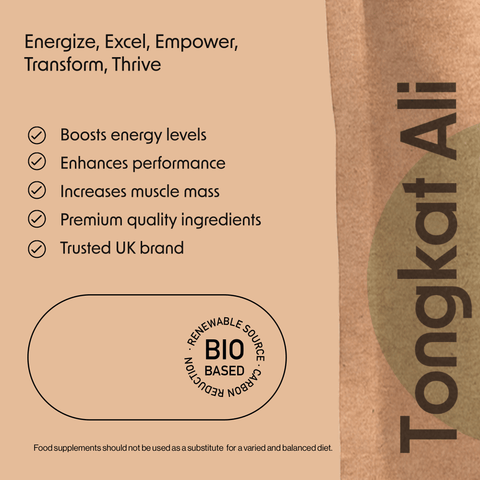Have you ever wondered about the potential benefits of Tongkat ali, also known as longjack? This is a herbal supplement has been used in traditional Southeast Asian medicine for centuries, this is a magical plant with claims of treating various ailments like fevers, erectile dysfunction, and infections. But what exactly does Tongkat ali do? We will explore the potential benefits, side effects, and dosage recommendations of Tongkat ali, based on the current body of scientific evidence.

Understanding Tongkat Ali
Botanical Profile
Some of the most comprehensive studies on Tongkat Ali (Eurycoma longifolia) have shed light on its botanical profile. This herbal supplement originates from the roots of the green shrub tree native to Southeast Asia. Commonly used in traditional medicine in countries like Malaysia, Indonesia, and Vietnam, Tongkat Ali has been historically employed to address various ailments, including fever, male infertility, and erectile dysfunction. Rich in flavonoids, alkaloids, and other beneficial compounds, Tongkat Ali acts as a potent antioxidant, combating cellular damage caused by free radicals. These antioxidant properties play a crucial role not only in addressing specific health issues but also in promoting overall well-being.
Active Components and Their Properties
Any discussion on Tongkat Ali would be incomplete without delving into its active components and their unique properties. The supplement contains compounds such as flavonoids, alkaloids, and quassinoids, including eurycomaoside, eurycolactone, and eurycomanone. These compounds contribute to Tongkat Ali's reputation for potentially enhancing athletic performance, increasing muscle mass, and improving body composition. Known to help the body use energy more efficiently, reduce fatigue, and enhance endurance, Tongkat Ali may serve as an ergogenic aid, supporting physical performance and fitness goals.
Their impact on testosterone levels, male fertility, stress reduction, and overall well-being is under ongoing scientific scrutiny. While research is still evolving, initial studies indicate promising effects of Tongkat Ali on various aspects of health. It is crucial to approach the use of Tongkat Ali with caution, considering both its potential benefits and any limitations in the current body of scientific research.
As research continues to explore the full spectrum of Tongkat Ali's capabilities, a nuanced understanding of its active components is crucial for harnessing its potential benefits effectively.

Key Takeaways:
- Tongkat ali is an herbal supplement that has been traditionally used in Southeast Asian medicine for centuries to treat various ailments.
- Potential benefits of tongkat ali include boosting testosterone levels, improving male fertility, relieving stress, and possibly enhancing body composition.
- Consulting a healthcare provider before taking tongkat ali is important, especially for pregnant or breastfeeding women and individuals with medical conditions or taking medications.

Health Benefits of Tongkat Ali
After exploring the potential health benefits of Tongkat Ali, it is evident that this herbal remedy offers a range of advantages for various aspects of well-being. In terms of testosterone and male reproductive health, Tongkat Ali has shown promising results. Studies have indicated that Tongkat Ali may have the ability to increase testosterone levels in men with low levels of this crucial hormone. Low testosterone can lead to issues such as low libido, erectile dysfunction, and even infertility. Research suggests that Tongkat Ali can help address these concerns, potentially improving male reproductive health.
Stress Reduction and Mental Wellbeing
Male mental health is an important yet often overlooked aspect of overall well-being. For instance, Tongkat Ali has been studied for its potential to reduce stress hormones in the body, decrease anxiety, and enhance mood. Research has shown that supplementing with Tongkat Ali extract may lead to a reduction in cortisol levels, a key stress hormone in the body. Participants in studies also reported feeling less stressed, angry, and tense after taking Tongkat Ali, indicating its potential in improving mental well-being.
Physical Performance and Muscle Mass
Health and physical performance are closely intertwined, and Tongkat Ali may play a role in enhancing athletic abilities and increasing muscle mass. Studies have suggested that Tongkat Ali contains compounds that can improve energy utilization, reduce fatigue, and enhance endurance. Furthermore, research has shown that individuals taking Tongkat Ali extract experienced significant increases in lean body mass and muscular strength compared to a placebo group. These findings hint at the potential of Tongkat Ali to positively impact physical performance and muscle development.
Research and Clinical Studies
Once again, it is imperative to research into research and clinical studies to understand the potential benefits and limitations of Tongkat Ali. In this chapter, we will explore the key studies that have investigated the effects of this herbal remedy.
Overview of Key Tongkat Ali Studies
Clinical studies on Tongkat Ali have shown promising results in various areas. For example, research suggests that Tongkat Ali may help increase testosterone levels and improve male fertility. Studies have demonstrated that the herb can boost low testosterone levels in men with a significant impact on sexual function and fertility. Additionally, Tongkat Ali has been linked to reducing stress levels and improving mood, with some results indicating its potential as an ergogenic aid to enhance athletic performance and muscle mass.
Analysis of Findings and Limitations
Analysis of these studies reveals both positive outcomes and limitations in the research on Tongkat Ali. While the herb shows potential in improving various health aspects, including testosterone levels, fertility, and stress reduction, the research is still in its early stages. Many studies are limited in sample size, duration, and scope, making it challenging to draw definitive conclusions. More extensive and rigorous studies are needed to fully understand the efficacy and safety of Tongkat Ali as a herbal supplement.

Administration and Dosage
Recommended Dosage for Adults
The recommended dosage of Tongkat Ali for adults can vary depending on the specific health concerns and desired outcomes. According to studies, a daily intake of 200-400 mg of Tongkat Ali extract is considered safe for most healthy adults. This dosage range has shown positive effects in improving testosterone levels, enhancing male fertility, reducing stress, and potentially boosting muscle mass.
Varied Dosage Forms and Their Uses
Recommended Tongkat Ali dosage forms for adults typically include pills containing an extract of the herb or herbal drinks. These forms provide convenient ways to incorporate Tongkat Ali into your daily routine. Pills are often preferred for precise dosing, while herbal drinks offer a more traditional approach to consuming the herb.
This variety in dosage forms allows individuals to choose the method that best suits their preferences and lifestyle while still reaping the potential benefits of Tongkat Ali supplementation.
Potential Side Effects and Risks
Known Adverse Reactions
Keep in mind that taking high doses of Tongkat ali may lead to DNA damage, as highlighted by the European Food Safety Authority. While studies have not reported any side effects in humans at moderate doses, it's crucial to be cautious about the potential risks associated with excessive consumption. Additionally, some Tongkat ali supplements may contain elevated levels of mercury, which can result in mercury poisoning if consumed in large quantities.
Precautions and Safety Considerations
Potential precautions and safety considerations when using Tongkat ali include its use in pregnant and breastfeeding women, as well as individuals with medical conditions or taking medications. Research on the safety of Tongkat ali in these populations is lacking, so it's advisable to consult a healthcare provider before incorporating this herbal remedy into your routine. Furthermore, while Tongkat ali appears safe in doses of 200–400 mg per day for most healthy adults, long-term effects and higher dosages have not been thoroughly studied.
Known adverse reactions are limited based on current research, so further investigation is warranted to fully understand the potential risks and benefits associated with Tongkat ali.

Purchasing and Quality Assurance
Choosing a Quality Supplement
Assurance is key when selecting a tongkat ali supplement. With the market flooded with various brands and products, it's important to prioritize quality and safety. Look for reputable brands that adhere to industry best practices and have been vetted by trusted sources. Consider factors like ingredient composition, potential for harm, and alignment with scientific evidence. Research the brand's integrity and whether they conduct third-party testing for their products.
Understanding Product Labels and Third-Party Testing
Labels play a crucial role in determining the quality of a tongkat ali supplement. For instance, look for key information such as the extract's concentration, dosage, and any additional ingredients. It's also important to check if the product has undergone third-party testing for purity and potency. This ensures that you are getting a reliable and effective supplement that meets quality standards.
For instance, the European Food Safety Authority issued a warning in 2021 regarding the potential DNA damage from certain tongkat ali extracts. Therefore, it's important to prioritize products that have been rigorously tested and verified by independent parties to ensure safety and effectiveness.
Conclusion
From above, Tongkat ali, also known as longjack, is a herbal supplement with potential benefits in improving testosterone levels, male fertility, anxiety, and body composition. While some studies suggest its effectiveness in treating certain conditions, research on tongkat ali is still limited and ongoing. It is crucial to consult with a healthcare provider before starting tongkat ali supplementation, especially for individuals with medical conditions or taking medications. Additionally, ensuring the quality and safety of the product is crucial, as some supplements may be contaminated with mercury or have inconsistent dosages. Pregnant and breastfeeding women should avoid tongkat ali due to the lack of research on its effects in these populations.
FAQ
Q: What does Tongkat Ali do?
A: Tongkat Ali, also known as longjack, is an herbal supplement derived from the roots of the Eurycoma longifolia tree. It has been traditionally used in Southeast Asian medicine for various purposes. Tongkat Ali is believed to have potential benefits in increasing testosterone levels, improving male fertility, relieving stress, and possibly enhancing body composition. However, research on these claims is still limited.
Q: How does Tongkat Ali impact testosterone levels?
A: Tongkat Ali has been studied for its potential to increase testosterone levels, particularly in men with low testosterone. Several compounds found in Tongkat Ali may help stimulate the production of this primary sex hormone. Research suggests that Tongkat Ali can improve symptoms associated with low testosterone, such as low libido, erectile dysfunction, and infertility.
Q: Are there any potential side effects of taking Tongkat Ali?
A: While Tongkat Ali is generally considered safe when taken in recommended doses, a high dose of the water-based extract may have the potential to cause DNA damage to stomach and duodenum tissues. It is important to be cautious with the dosage and quality of Tongkat Ali supplements, as some products may be contaminated with mercury. Pregnant, breastfeeding women, children, and individuals with medical conditions should consult a healthcare provider before taking Tongkat Ali.










